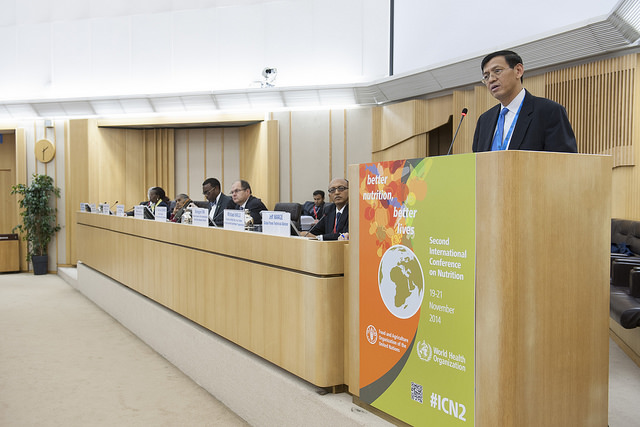- IFPRI would like to applaud UN Secretary General Ban Ki-moon’s leadership, with ICN2 and the Zero Hunger Challenge, in calling for a global partnership of multiple stakeholders to eliminate hunger and malnutrition.
- We at IFPRI congratulate FAO and WHO and partners on successfully organizing ICN2.
- The two main outcome documents of ICN2–the Rome Declaration on Nutrition and the Framework for Action, which are recommended for endorsement by the UN General Assembly–signal commitments on nutrition and propose how to move forward to action.
- Eliminating hunger and undernutrition is key to ending extreme poverty. If we aim to end extreme poverty by 2030, we must end hunger and undernutrition first.
- By adapting successful strategies employed by countries such as Brazil, China, Thailand, and Vietnam, it is possible to end hunger and undernutrition by 2025:
- China and Vietnam—both agriculture based-societies where smallholders predominate–successfully adopted agriculture-led strategies:
- Vietnam reduced hunger from 45% in 1990-1992 to 13% in 2012-14
- China reduced child stunting from 32% in 1990 to 8% in 2010.
- Brazil employed social protection-led strategies and targeted nutrition interventions to eliminate hunger and reduce child stunting from 19% in 1989 to 7% in 2007.
- Thailand adopted agriculture-led and social protection-led strategies, as well as targeted nutrition interventions to rapidly reduce hunger and undernutrition:
- It reduced hunger from 36% in 1990 to about 7% in 2012-14
- It reduced child stunting from 25% in 1987 to 6% in 2008-09.
- To accelerate the pace to end hunger and undernutrition, it is important to:
- Learn from these countries,
- Capitalize on increased public and political attention to food and nutrition security, and
- Prioritize women’s empowerment within all strategies.
- Accelerating improvements in nutrition will require leveraging multisectoral approaches, including:
- Implementing nutrition-specific interventions (such as fortification, breastfeeding and complementary feeding, dietary diversification) and nutrition-sensitive programs (such as quality sanitation and healthcare, women and girls empowerment), and
- Leveraging agriculture for better nutrition outcomes is critical, particularly promoting biofortified staple food crops as well as nutrient-rich crops such as fruits, vegetables, and beans.
- A country-led approach is key to eliminating hunger and undernutrition:
- Externally-driven approaches (such as structural-adjustment reforms of the 80s and 90s) have not been successful.
- Effective, efficient, and sustainable policies that are well adapted to the local context can help countries to:
- maximize the local impact of the global agenda, and
- tap into external development assistance, which increasingly requires country-led plans.
- IFPRI is committed to supporting the Rome Declaration on Nutrition and Framework for Action. We look forward to contributing to this initiative by providing a knowledge and innovation platform to experiment, learn, and share evidence and policy options:Compact2025.
- Compact2025—an inclusive, multi-stakeholder partnership committed to ending hunger and undernutrition globally–will:
- Provide research-based guidance on developing, implementing, and scaling up successful policies and strategies;
- Fill knowledge gaps in designing country-led food security and nutrition strategies;
- Identify pragmatic, action-oriented strategies to address challenges on the ground while learning from stakeholders at all levels and from all sectors; and
- Work with countries to develop context-specific, practical road maps to accelerate the elimination of hunger and undernutrition.
- Compact2025 complements and leverages established networks already working to eliminate hunger and undernutrition (such as SUN) and works with those who are already dedicated to achieving this goal by 2025 (such as G8 and African Union).
IFPRI Blog:
Director General’s Office (DGO)Compact2025: New partnership for ending global hunger and undernutrition







